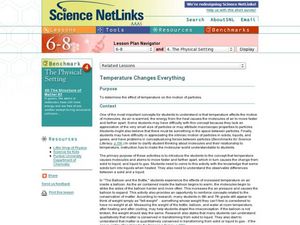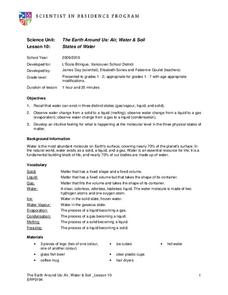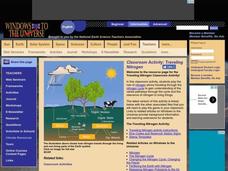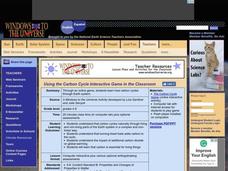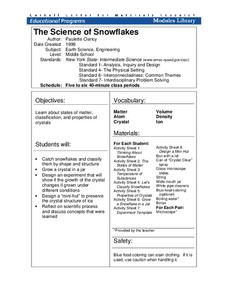Curated OER
Can You Get A Charge Out Of Matter?
Students observe and demonstrate how objects can be charged positively and negatively and how static electricity works. They observe a teacher-led demonstration, and in small groups rotate through various static electricity activities,...
Curated OER
Classifying Matter Game
Students identify the different states of matter. In this chemistry lesson, students differentiate the physical properties of the three states. They apply what they learned by playing a team game at the end of the lesson.
Curated OER
How Big is a Molecule?
Students estimate the size of a molecule of oleic acid. They conduct an experiment using chalk dust, water, and oleic acid, solve various calculations, and answer discussion questions.
Curated OER
Atoms, Kinetic Theory, Solids and Fluids
Students identify and describe the building blocks that make up an atom. They also compare the ages of atoms to the ages of the materials they compose,as well as, give examples that illustrate the small size of atoms.
American Chemical Society
Identifying an Unknown Liquid
Liquids are what's the matter with the lesson! Learners investigate properties of different liquids as they interact with various types of paper. They then use their observations to identify a mystery liquid to finish the sixth lesson in...
Curated OER
What is Everything Made of?
Students observe a demonstration on how we see space between water molecules. In this experimental lesson students discover what elements make up the things around them and discuss what they learned.
Curated OER
Temperature Changes Everything
Middle school chemists visit interactive websites in order to discover what happens to molecular motion when heat is added to matter. They conduct an experiment that demonstrates the expansion of matter with the addition of heat. A lab...
Curated OER
Activity #5 Environmental Effects
Learners explain the implications of particle theory of The Law of Conservation of Matter for problems of pollution and waste disposal. They describe, in terms of atoms and molecules, what happens to materials when they are dissolved or...
Curated OER
Molecular Modeling
Students recognize that the fundamental building block of all organic and inorganic matter is the atom. They construct models of a sugar, fatty acid, amino acid and nucleic acid and describe their roles.
Curated OER
Solids, Liquids, and Gases
First graders explore the properties of matter. In this states of matter instructional activity, 1st graders conduct scientific investigations that require them to mix, cool, and heat objects in order to observe changes in the properties...
Curated OER
Properties of Metals
Fifth graders study the properties of metals and use them to identify different properties. In this metal properties lesson students complete a demonstration .
Curated OER
Activity #3 Are Particles "Real?"
Students verbalize a simple particle theory, They apply their particle theory to explain what happens during chemical reactions and how this theory supports the law of conservation of matter. Pupils comprehend that the atomic theory,...
Curated OER
States of Water
Students investigate the 3 states of matter. In this physical science "matter" activity, students observe and participate in a number of demonstrations involving melting and freezing water. Students observe the effect heat has on...
Curated OER
Traveling Nitrogen
Students act out the cycling of nitrogen through the environment. In this nutrient cycle instructional activity, students role play as nitrogen atoms traveling through the nitrogen cycle. They travel to stations and roll dice to...
Curated OER
Using the Carbon Cycle Interactive Game in the Classroom
An online reading and interactive game bring the path of a carbon molecule to life for your earth science explorers! As an assessment, learners can map out or write about their experience in the carbon cycle. Thoroughly written...
Curated OER
Boot Reer Root Beer
Fifth graders investigate chemical reactions. In this physical science activity, 5th graders make dry ice root beer and identify the type of change that occurs to the root beer mixture.
Curated OER
Heat Transfer & Phase Changes
In this heat transfer and phase change worksheet, learners experiment with ice, salt, and milk to show the relationship between the temperature of a solution and its phase. Students turn milk from a liquid to a solid and graph the...
American Chemical Society
Air, It's Really There
Love is in the air? Wrong — nitrogen, oxygen, and carbon dioxide are in the air. The final lesson in the series of five covers the impact of temperature on gases. Scholars view a demonstration of gas as a type of matter before performing...
Cornell University
Atomic Bonding
Explore the connection of surface area to bonding within atoms. Learners complete lab investigations to model changing surface area with different sizes and concentrations of atoms. A flour fireball demonstration follows the labs to...
Curated OER
Water Chemistry
Students engage in a lesson that is concerned with the concept of water chemistry. They conduct research using a variety of resources. Students also consider an experiment to observe how water has the abiility to exist as three different...
Curated OER
The Structure of Materials
Students brainstorm what matter is and how they define it. They construct a water molecule with marshmallows and toothpicks. In addition, they watch videos to explore the use the idea of nanoscience to investigate the properties of...
Curated OER
How Does a Liquid Become a Solid?
Students explore the energy changes from a liquid to a solid. They model the arrangement of a solid and the change in states due to changes in energy using desks and chairs. Assessment questions are provided in lesson plan.
Cornell University
The Science of Snowflakes
Who can grow the best crystals? Challenge class members to develop strategies for enhancing growth in the crystals. Through a lab investigation, learners study the properties of crystals and test the effectiveness of different growth...
Curated OER
Periodic Table of the Elements
First graders discuss, at their level, the concept of elements making up all matter. They discover the story of Dimitri Mendeleev and his discovery of the Periodic Table of the Elements. They locate and color some of the most common...








